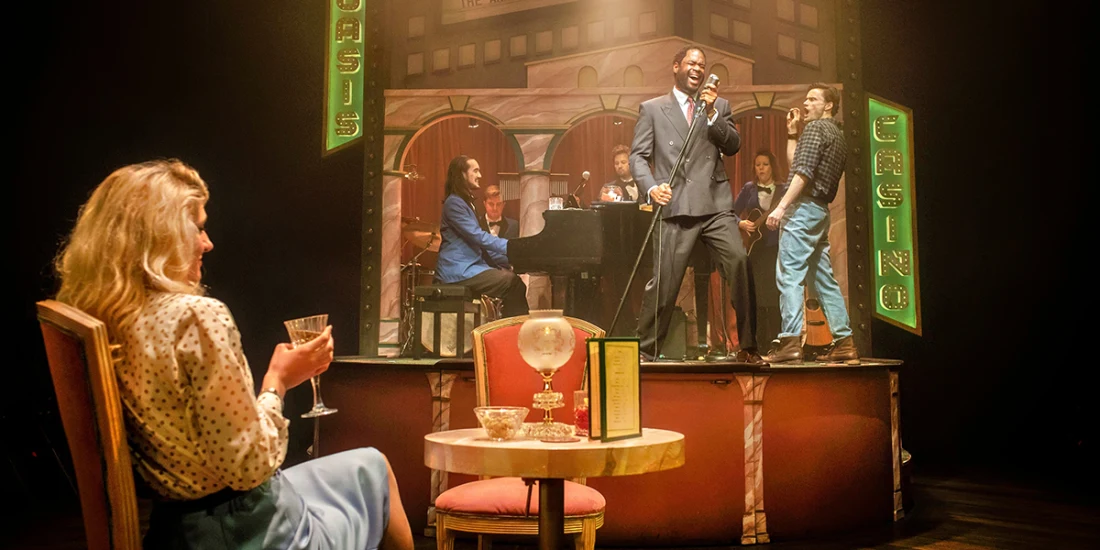'Indecent Proposal' review - a musical misfire needs more work
It's back to the drawing board for Indecent Proposal, the bewildering new musical that has arrived at Southwark Playhouse in what would appear to be far from any sort of finished state. Many will know the title from the 1993 film, with Demi Moore, Woody Harrelson, and Robert Redford, in which a billionaire (Redford) pays $1 million to secure sex with Moore: largely derided at the time, the movie rode the coattails of Pretty Woman (itself now a stage musical) conjoining far-fetched fantasy with vague gestures towards meditations on morality: two libidinous lectures, glossily served up.
The stage musical barely gets to that level, citing as its source not the film but the novel by Jack Engelhard and so perfunctorily written that half the time you expect the plot to give up altogether so that the show can become the Jacqueline Dankworth concert that, really, is its sole reason for being. Playing a lounge singer called Annie who can deliver a peppery, world-weary remark with the best of 'em, the smoky-voiced Dankworth seems to belong to a different evening altogether. A much better one.
The bulk of the narrative heavy lifting falls to Norman Bowman and Lizzy Connolly, as Jonny and Rebecca - a couple in financial distress, it would seem, because their ceiling is caving in. Enter the usefully timed appearance of the suavely attired Larry (Ako Mitchell), a financial powerhouse who comes bearing the proposal of the title alongside the intriguing suggestion, at least at first, that he doesn't care which of the couple responds to his offer. "Everyone," notes Larry, "has their price." (Interestingly, his character in the film has the name given in the show to the husband of a couple, both of whom, we learn, have been married before.)
What Indecent Proposal doesn't give much evidence of is a score, beyond an opening number, the all too aptly titled "Next to Nothing," which gets reprised too many times. Almost none of the songs exist in the service of the plot, belonging instead to the Atlantic City music-making milieu ca. 1988 in which Jonny is attempting to make his mark. When two songs do arrive back-to-back that are driven by character and not by circumstance, they succeed mostly in throwing around pronouns aplenty ("The We That We Were" sounds like someone misheard "The Way We Were") and backing Connolly into a shrieking solo, "Wait and See." Connolly deserves better than a substandard 11 o-clock number that seems to have been written at a bleary-eyed 4 am.
The assignation at the crux of the dubiously plotted narrative is barely dramatised, thereby losing out on any number of opportunities to examine in what ways Rebecca and Larry are affected by their time together, if at all. The result for Jonny seems to be an inevitable detumescence which requires the hapless Bowman to power through a nightmare sequence in his underwear at the top of the second act. Mitchell as ever is an appealing stage presence but has less than nothing to work with: the Gatsby-esque quality captured onscreen by Redford (who had of course himself played Gatsby by the time this film came along) is nowhere in evidence, replaced by a pile-up of stale bromides about the relationship between love and money and - wait for it - the American dream.
Charlotte Westenra's production feels like a lounge act into which a sexual melodrama has been awkwardly interpolated, and though the programme promises songs aplenty, a good chunk of the music is instrumental - and thereby incidental. (The music and lyrics are by Dylan Schlosberg and Michael Conley, with a book by Conley.) There's precious little at stake in an evening that ultimately abandons its own story, ending with the sort of rhetorical question that should have been answered at the first readthrough. If the creators of Indecent Proposal can't make heads or tails out of their own concoction, how in heaven's name can we?
Photo credit: Indecent Proposal (Photo courtesy of Indecent Proposal)
Originally published on
